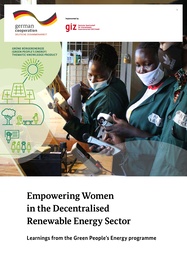Energy poverty affects women and men differently. Due to socio-cultural norms and traditional male-dominated structures, women in Sub-Saharan Africa lack the skills, knowledge, decision-making power and/or financial means to access energy. In the energy sector, women are underrepresented as politicians, managers, entrepreneurs, technicians and as direct users of energy appliances. A 2019 IRENA report describes how lack of access to training and skills development is the biggest challenge to women’s participation in the off-grid energy sector. To reach more women with energy projects, ensure women benefit and contribute to transformative change, special efforts need to be made.
In its technical training and business development activities in the field of renewable energy, Green People’s Energy is committed to:
The impact of including a gender perspective into energy interventions is highlighted in the case studies and factsheets below. They underline how training women in the energy sector and energy access in general can have a positive impact on women's wellbeing and gender equality.
are designed to share the knowledge and learnings about the topics gathered during the implementation and to make them accessible for practitioners. The following knowledge products outline the latest approches to PUE projects at the time of project implementation as well as learnings and recommendations from the GBE projects.
Blue flags show the location of the relevant Small Projects Fund projects. The relevant case studies can be seen by hovering over the green highlighted countries.
Loading map...
{"format":"leaflet","minzoom":false,"maxzoom":false,"limit":50,"offset":0,"link":"all","sort":[""],"order":[],"headers":"show","mainlabel":"","intro":"","outro":"","searchlabel":"... further results","default":"","import-annotation":false,"width":"auto","height":"1000px","centre":{"text":"","title":"","link":"","lat":-2.9814344,"lon":23.8222636,"icon":""},"title":"","label":"","icon":"","lines":[],"polygons":[{"text":"\u003Cdiv class=\"mw-parser-output\"\u003E\u003Cdiv style=\"font-size:130%\"\u003ECase studies, publications \u0026amp; other studies in \u003Cb\u003ESenegal\u003C/b\u003E (3)\u003C/div\u003E\n\u003Chr /\u003E\n\u003Cul\u003E\u003Cli\u003E\u003Ca href=\"/wiki/Empowering_Women_through_Productive_Use_in_the_Agricultural_Value_Chain_in_the_Villages_of_Nguidjilone_in_Senegal\" title=\"Empowering Women through Productive Use in the Agricultural Value Chain in the Villages of Nguidjilone in Senegal\"\u003EEmpowering Women through Productive Use in the Agricultural Value Chain in the Villages of Nguidjilone in Senegal\u003C/a\u003E\u003C/li\u003E\n\u003Cli\u003E\u003Ca href=\"/wiki/Positive_Effects_of_Access_to_Renewable_Energy_in_the_Banana_Value_Chain_in_Senegal\" title=\"Positive Effects of Access to Renewable Energy in the Banana Value Chain in Senegal\"\u003EPositive Effects of Access to Renewable Energy in the Banana Value Chain in Senegal\u003C/a\u003E\u003C/li\u003E\n\u003Cli\u003E\u003Ca href=\"/wiki/Promotion_of_Productive_Use_Appliances_in_Senegal_through_Results_Based_Financing\" title=\"Promotion of Productive Use Appliances in Senegal through Results Based Financing\"\u003EPromotion of Productive Use Appliances in Senegal through Results Based Financing\u003C/a\u003E\u003C/li\u003E\u003C/ul\u003E\u003C/div\u003E","title":"Case studies, publications \u0026amp; other studies in Senegal (3)\n\nEmpowering Women through Productive Use in the Agricultural Value Chain in the Villages of Nguidjilone in Senegal\nPositive Effects of Access to Renewable Energy in the Banana Value Chain in Senegal\nPromotion of Productive Use Appliances in Senegal through Results Based Financing","link":"","strokeColor":"#3D7C63","strokeOpacity":"1","strokeWeight":"2","pos":[{"lat":16.704738548901805,"lon":-14.98635322724143},{"lat":16.652117850637666,"lon":-14.92592842255393},{"lat":16.66264314828649,"lon":-14.82155830536643},{"lat":16.652117850637666,"lon":-14.64028389130393},{"lat":16.631065520609383,"lon":-14.58535225067893},{"lat":16.631065520609383,"lon":-14.46999580536643},{"lat":16.66264314828649,"lon":-14.40957100067893},{"lat":16.631065520609383,"lon":-14.31618721161643},{"lat":16.325548369174623,"lon":-13.96462471161643},{"lat":16.230635154598048,"lon":-13.94265205536643},{"lat":16.193712080167263,"lon":-13.87124092255393},{"lat":16.109290551269954,"lon":-13.84926826630393},{"lat":16.17788578887371,"lon":-13.71193916474143},{"lat":16.098735329655792,"lon":-13.67348701630393},{"lat":16.151505818762963,"lon":-13.48671943817893},{"lat":16.072344820914953,"lon":-13.38784248505393},{"lat":15.697224039118806,"lon":-13.22304756317893},{"lat":15.617884194734206,"lon":-13.24502021942893},{"lat":15.633754626002451,"lon":-13.19558174286643},{"lat":15.580848411126354,"lon":-13.08571846161643},{"lat":15.480289097944217,"lon":-13.10219795380393},{"lat":15.51204996730072,"lon":-12.96486885224143},{"lat":15.43263865269209,"lon":-12.92641670380393},{"lat":15.337304965456076,"lon":-12.93740303192893},{"lat":15.310815650776684,"lon":-12.84401924286643},{"lat":15.210125718200182,"lon":-12.84951240692893},{"lat":15.098780857866027,"lon":-12.70119697724143},{"lat":15.130599652323422,"lon":-12.65725166474143},{"lat":15.013907453169413,"lon":-12.48696357880393},{"lat":14.971458089781983,"lon":-12.45400459442893},{"lat":14.891842877857172,"lon":-12.45400459442893},{"lat":14.743149184202341,"lon":-12.22329170380393},{"lat":14.668764172989532,"lon":-12.15737373505393},{"lat":14.604985460859574,"lon":-12.15188057099143},{"lat":14.546505383636708,"lon":-12.21230537567893},{"lat":14.482691268717971,"lon":-12.20681221161643},{"lat":14.42417886319763,"lon":-12.19033271942893},{"lat":14.370972425251086,"lon":-12.09694893036643},{"lat":14.312430720091095,"lon":-12.08596260224143},{"lat":14.291139039741873,"lon":-12.01455146942893},{"lat":14.18997607839294,"lon":-11.97060615692893},{"lat":13.982184555477811,"lon":-11.99807197724143},{"lat":13.934205900731977,"lon":-11.93215400849143},{"lat":13.795545004252427,"lon":-11.94314033661643},{"lat":13.715510781189082,"lon":-12.07497627411643},{"lat":13.614094934696688,"lon":-12.03652412567893},{"lat":13.432505590092163,"lon":-11.86074287567893},{"lat":13.309587633680046,"lon":-11.83327705536643},{"lat":13.336314256317177,"lon":-11.78383857880393},{"lat":13.421819563346496,"lon":-11.74538643036643},{"lat":13.39510241638686,"lon":-11.61904365692893},{"lat":13.250778688926985,"lon":-11.52565986786643},{"lat":13.202651701808263,"lon":-11.52565986786643},{"lat":13.090318565818118,"lon":-11.47072822724143},{"lat":13.084968087653952,"lon":-11.42128975067893},{"lat":12.95116850430736,"lon":-11.35537178192893},{"lat":12.86014367963901,"lon":-11.39931709442893},{"lat":12.742297854491607,"lon":-11.37185127411643},{"lat":12.72622370992208,"lon":-11.43776924286643},{"lat":12.62975749596086,"lon":-11.41030342255393},{"lat":12.533254875499662,"lon":-11.43227607880393},{"lat":12.501079289957675,"lon":-11.36086494599143},{"lat":12.40452853222202,"lon":-11.37185127411643},{"lat":12.44744441521804,"lon":-11.50368721161643},{"lat":12.366971333087534,"lon":-11.80581123505393},{"lat":12.442080317342027,"lon":-11.91018135224143},{"lat":12.399163549172117,"lon":-11.98708564911643},{"lat":12.420622818252037,"lon":-12.06948311005393},{"lat":12.30257501151973,"lon":-12.36611396942893},{"lat":12.383067937529415,"lon":-12.41005928192893},{"lat":12.393798455676873,"lon":-12.53090889130393},{"lat":12.36160557786052,"lon":-12.58034736786643},{"lat":12.452808402245996,"lon":-12.66274482880393},{"lat":12.431351789224749,"lon":-12.77260811005393},{"lat":12.495716302574097,"lon":-12.83303291474143},{"lat":12.543979178652485,"lon":-12.90444404755393},{"lat":12.517167584159417,"lon":-12.95388252411643},{"lat":12.463536043578866,"lon":-12.96486885224143},{"lat":12.495716302574097,"lon":-13.09121162567893},{"lat":12.635117687577317,"lon":-13.05825264130393},{"lat":12.683354348310946,"lon":-15.22255928192893},{"lat":12.608315606281948,"lon":-15.34890205536643},{"lat":12.560064795877889,"lon":-15.38735420380393},{"lat":12.420622818252037,"lon":-15.68947822724143},{"lat":12.452808402245996,"lon":-15.90371162567893},{"lat":12.431351789224749,"lon":-15.97512275849143},{"lat":12.479626673099855,"lon":-16.07399971161643},{"lat":12.442080317342027,"lon":-16.16189033661643},{"lat":12.463536043578866,"lon":-16.22780830536643},{"lat":12.350873737055723,"lon":-16.39809639130393},{"lat":12.334775150643738,"lon":-16.72219307099143},{"lat":12.40452853222202,"lon":-16.78811103974143},{"lat":12.479626673099855,"lon":-16.81008369599143},{"lat":12.55470303519611,"lon":-16.76613838349143},{"lat":12.753013384442704,"lon":-16.79909736786643},{"lat":12.924399938227003,"lon":-16.76064521942893},{"lat":13.084968087653952,"lon":-16.75515205536643},{"lat":13.1759103859959,"lon":-16.70571357880393},{"lat":13.165213041165574,"lon":-15.79384834442893},{"lat":13.357693427006865,"lon":-15.81582100067893},{"lat":13.347004078246893,"lon":-15.72793037567893},{"lat":13.389758630757798,"lon":-15.68398506317893},{"lat":13.35234881179505,"lon":-15.59609443817893},{"lat":13.389758630757798,"lon":-15.51919014130393},{"lat":13.363037923838487,"lon":-15.35439521942893},{"lat":13.363037923838487,"lon":-15.29397041474143},{"lat":13.496611742802907,"lon":-15.20058662567893},{"lat":13.576720222167358,"lon":-15.15664131317893},{"lat":13.59807792276649,"lon":-15.09072334442893},{"lat":13.480586815183166,"lon":-14.99184639130393},{"lat":13.453876215304403,"lon":-14.87099678192893},{"lat":13.416476371592106,"lon":-14.81057197724143},{"lat":13.421819563346496,"lon":-14.75014717255393},{"lat":13.35234881179505,"lon":-14.68422920380393},{"lat":13.35234881179505,"lon":-14.56887275849143},{"lat":13.29889615842228,"lon":-14.46999580536643},{"lat":13.229390089983296,"lon":-14.38210518036643},{"lat":13.245431715333428,"lon":-14.25576240692893},{"lat":13.197303672680652,"lon":-14.20632393036643},{"lat":13.22404264682342,"lon":-14.12392646942893},{"lat":13.288204211575712,"lon":-14.11294014130393},{"lat":13.293550243925637,"lon":-14.00307686005393},{"lat":13.336314256317177,"lon":-13.95363838349143},{"lat":13.314933194353303,"lon":-13.85476143036643},{"lat":13.405789631539369,"lon":-13.79433662567893},{"lat":13.58205982768892,"lon":-13.90969307099143},{"lat":13.587399312991735,"lon":-13.98659736786643},{"lat":13.55536059876725,"lon":-14.04702217255393},{"lat":13.533999055361788,"lon":-14.18984443817893},{"lat":13.480586815183166,"lon":-14.26674873505393},{"lat":13.46456081307016,"lon":-14.32168037567893},{"lat":13.533999055361788,"lon":-14.48098213349143},{"lat":13.614094934696688,"lon":-14.49746162567893},{"lat":13.672814692474535,"lon":-14.59633857880393},{"lat":13.614094934696688,"lon":-14.73366768036643},{"lat":13.672814692474535,"lon":-14.78859932099143},{"lat":13.790210241487138,"lon":-14.83803779755393},{"lat":13.822216987791077,"lon":-14.94790107880393},{"lat":13.81688283526655,"lon":-15.00832588349143},{"lat":13.832884926261233,"lon":-15.08523018036643},{"lat":13.742191895515814,"lon":-15.25002510224143},{"lat":13.790210241487138,"lon":-15.32692939911643},{"lat":13.779540350246608,"lon":-15.41482002411643},{"lat":13.69950065653943,"lon":-15.45876533661643},{"lat":13.592738678032141,"lon":-15.48073799286643},{"lat":13.592738678032141,"lon":-16.58486396942893},{"lat":13.81688283526655,"lon":-16.76064521942893},{"lat":14.078111828024895,"lon":-16.78261787567893},{"lat":14.158020478873821,"lon":-16.82656318817893},{"lat":14.216602303076792,"lon":-16.90346748505393},{"lat":14.31775332490587,"lon":-16.95290596161643},{"lat":14.42417886319763,"lon":-16.98037178192893},{"lat":14.461415812679926,"lon":-17.07924873505393},{"lat":14.636877134632229,"lon":-17.17812568817893},{"lat":14.700646566730327,"lon":-17.27150947724143},{"lat":14.743149184202341,"lon":-17.39785225067893},{"lat":14.716586018996091,"lon":-17.44729072724143},{"lat":14.652821233813045,"lon":-17.44729072724143},{"lat":14.737836810216526,"lon":-17.54616768036643},{"lat":14.80157673425707,"lon":-17.54616768036643},{"lat":14.806887550085968,"lon":-17.40883857880393},{"lat":14.90776827922674,"lon":-17.13418037567893},{"lat":15.818818474213723,"lon":-16.51894600067893},{"lat":16.030112723627173,"lon":-16.51894600067893},{"lat":16.09345750836328,"lon":-16.45852119599143},{"lat":16.21481182703008,"lon":-16.46401436005393},{"lat":16.230635154598048,"lon":-16.40358955536643},{"lat":16.272824473066965,"lon":-16.35964424286643},{"lat":16.357175890104855,"lon":-16.37063057099143},{"lat":16.409877035489846,"lon":-16.33217842255393},{"lat":16.49943620622905,"lon":-16.29921943817893},{"lat":16.552098723437407,"lon":-16.26626045380393},{"lat":16.520502936339614,"lon":-16.18935615692893},{"lat":16.578424591379516,"lon":-16.11794502411643},{"lat":16.483634652668968,"lon":-16.05202705536643},{"lat":16.525769260030653,"lon":-15.87075264130393},{"lat":16.46783180948968,"lon":-15.67299873505393},{"lat":16.536301476524716,"lon":-15.60708076630393},{"lat":16.536301476524716,"lon":-15.51919014130393},{"lat":16.61001087976402,"lon":-15.48073799286643},{"lat":16.552098723437407,"lon":-15.39834053192893},{"lat":16.583689333066317,"lon":-15.25002510224143},{"lat":16.573159705671497,"lon":-15.18410713349143},{"lat":16.583689333066317,"lon":-15.10170967255393},{"lat":16.68895385999934,"lon":-15.11818916474143},{"lat":16.631065520609383,"lon":-15.04128486786643},{"lat":16.704738548901805,"lon":-14.98635322724143}],"onlyVisibleOnHover":false,"fillColor":"#C8D420","fillOpacity":"0.5"},{"text":"\u003Cdiv class=\"mw-parser-output\"\u003E\u003Cdiv style=\"font-size:130%\"\u003ECase studies, publications \u0026amp; other studies in \u003Cb\u003EGhana\u003C/b\u003E (0)\u003C/div\u003E\n\u003Chr /\u003E\u003C/div\u003E","title":"Case studies, publications \u0026amp; other studies in Ghana (0)\n","link":"","strokeColor":"#3D7C63","strokeOpacity":"1","strokeWeight":"2","pos":[{"lat":5.759927,"lon":0.663745},{"lat":5.757773,"lon":0.255836},{"lat":4.730836,"lon":-2.058891},{"lat":5.085018,"lon":-3.103046},{"lat":5.109545,"lon":-3.102273},{"lat":5.100218,"lon":-2.928127},{"lat":5.112782,"lon":-2.734446},{"lat":5.579164,"lon":-2.764446},{"lat":5.7075,"lon":-3.013609},{"lat":6.613745,"lon":-3.248891},{"lat":7.942918,"lon":-2.775137},{"lat":8.197773,"lon":-2.487782},{"lat":9.063609,"lon":-2.7675},{"lat":9.481818,"lon":-2.685564},{"lat":10.708145,"lon":-2.927527},{"lat":11.002009,"lon":-2.834046},{"lat":10.913891,"lon":-0.618473},{"lat":11.138536,"lon":-0.149764},{"lat":11.077154,"lon":0.031318},{"lat":10.650827,"lon":-0.078755},{"lat":10.254164,"lon":0.366527},{"lat":9.460282,"lon":0.217218},{"lat":9.408891,"lon":0.550627},{"lat":8.844445,"lon":0.512782},{"lat":8.760754,"lon":0.382736},{"lat":8.323745,"lon":0.726245},{"lat":6.947782,"lon":0.525},{"lat":6.447782,"lon":0.758891},{"lat":6.100545,"lon":1.198891},{"lat":5.780836,"lon":0.945},{"lat":5.753854,"lon":0.687991},{"lat":5.856654,"lon":0.626754}],"onlyVisibleOnHover":false,"fillColor":"#C8D420","fillOpacity":"0.5"},{"text":"\u003Cdiv class=\"mw-parser-output\"\u003E\u003Cdiv style=\"font-size:130%\"\u003ECase studies, publications \u0026amp; other studies in \u003Cb\u003EEthiopia\u003C/b\u003E (0)\u003C/div\u003E\n\u003Chr /\u003E\u003C/div\u003E","title":"Case studies, publications \u0026amp; other studies in Ethiopia (0)\n","link":"","strokeColor":"#3D7C63","strokeOpacity":"1","strokeWeight":"2","pos":[{"lat":14.95943,"lon":37.90607},{"lat":14.50547,"lon":38.51295},{"lat":14.74064,"lon":39.0994},{"lat":14.53155,"lon":39.34061},{"lat":14.51959,"lon":40.02625},{"lat":14.11864,"lon":40.8966},{"lat":13.77333,"lon":41.1552},{"lat":13.45209,"lon":41.59856},{"lat":12.86582,"lon":42.00975},{"lat":12.54223,"lon":42.35156},{"lat":12.1,"lon":42},{"lat":11.6312,"lon":41.66176},{"lat":11.35511,"lon":41.73959},{"lat":11.05091,"lon":41.75557},{"lat":11.0342,"lon":42.31414},{"lat":11.10511,"lon":42.55493},{"lat":10.926879,"lon":42.776852},{"lat":10.57258,"lon":42.55876},{"lat":10.02194,"lon":42.92812},{"lat":9.54048,"lon":43.29699},{"lat":9.18358,"lon":43.67875},{"lat":7.99688,"lon":46.94834},{"lat":8.003,"lon":47.78942},{"lat":5.00162,"lon":44.9636},{"lat":4.95755,"lon":43.66087},{"lat":4.25259,"lon":42.76967},{"lat":4.23413,"lon":42.12861},{"lat":3.918912,"lon":41.855083},{"lat":3.91909,"lon":41.1718},{"lat":4.25702,"lon":40.76848},{"lat":3.83879,"lon":39.85494},{"lat":3.42206,"lon":39.559384},{"lat":3.50074,"lon":38.89251},{"lat":3.61607,"lon":38.67114},{"lat":3.58851,"lon":38.43697},{"lat":3.598605,"lon":38.120915},{"lat":4.447864,"lon":36.855093},{"lat":4.447864,"lon":36.159079},{"lat":4.776966,"lon":35.817448},{"lat":5.338232,"lon":35.817448},{"lat":5.506,"lon":35.298007},{"lat":6.59422,"lon":34.70702},{"lat":6.82607,"lon":34.25032},{"lat":7.22595,"lon":34.0751},{"lat":7.71334,"lon":33.56829},{"lat":7.78497,"lon":32.95418},{"lat":8.35458,"lon":33.2948},{"lat":8.37916,"lon":33.8255},{"lat":8.68456,"lon":33.97498},{"lat":9.58358,"lon":33.96162},{"lat":10.63009,"lon":34.25745},{"lat":10.91017,"lon":34.73115},{"lat":11.31896,"lon":34.83163},{"lat":12.08286,"lon":35.26049},{"lat":12.57828,"lon":35.86363},{"lat":13.56333,"lon":36.27022},{"lat":14.42211,"lon":36.42951},{"lat":14.2131,"lon":37.59377},{"lat":14.95943,"lon":37.90607}],"onlyVisibleOnHover":false,"fillColor":"#C8D420","fillOpacity":"0.5"},{"text":"\u003Cdiv class=\"mw-parser-output\"\u003E\u003Cdiv style=\"font-size:130%\"\u003ECase studies, publications \u0026amp; other studies in \u003Cb\u003EBenin\u003C/b\u003E (1)\u003C/div\u003E\n\u003Chr /\u003E\n\u003Cul\u003E\u003Cli\u003E\u003Ca href=\"/wiki/Strengthening_Young_Female_Engineers_Working_in_Renewable_Energy_in_Benin\" title=\"Strengthening Young Female Engineers Working in Renewable Energy in Benin\"\u003EStrengthening Young Female Engineers Working in Renewable Energy in Benin\u003C/a\u003E\u003C/li\u003E\u003C/ul\u003E\u003C/div\u003E","title":"Case studies, publications \u0026amp; other studies in Benin (1)\n\nStrengthening Young Female Engineers Working in Renewable Energy in Benin","link":"","strokeColor":"#3D7C63","strokeOpacity":"1","strokeWeight":"2","pos":[{"lat":6.258817,"lon":2.691702},{"lat":6.142158,"lon":1.865241},{"lat":6.832038,"lon":1.618951},{"lat":9.12859,"lon":1.664478},{"lat":9.334624,"lon":1.463043},{"lat":9.825395,"lon":1.425061},{"lat":10.175607,"lon":1.077795},{"lat":10.470808,"lon":0.772336},{"lat":10.997339,"lon":0.899563},{"lat":11.110511,"lon":1.24347},{"lat":11.547719,"lon":1.447178},{"lat":11.64115,"lon":1.935986},{"lat":11.94015,"lon":2.154474},{"lat":12.233052,"lon":2.490164},{"lat":12.235636,"lon":2.848643},{"lat":11.660167,"lon":3.61118},{"lat":11.327939,"lon":3.572216},{"lat":10.734746,"lon":3.797112},{"lat":10.332186,"lon":3.60007},{"lat":10.06321,"lon":3.705438},{"lat":9.444153,"lon":3.220352},{"lat":9.137608,"lon":2.912308},{"lat":8.506845,"lon":2.723793},{"lat":7.870734,"lon":2.749063},{"lat":6.258817,"lon":2.691702}],"onlyVisibleOnHover":false,"fillColor":"#C8D420","fillOpacity":"0.5"},{"text":"\u003Cdiv class=\"mw-parser-output\"\u003E\u003Cdiv style=\"font-size:130%\"\u003ECase studies, publications \u0026amp; other studies in \u003Cb\u003EUganda\u003C/b\u003E (2)\u003C/div\u003E\n\u003Chr /\u003E\n\u003Cul\u003E\u003Cli\u003E\u003Ca href=\"/wiki/Disseminating_Rural_Energy_Access_with_Training_in_Uganda\" title=\"Disseminating Rural Energy Access with Training in Uganda\"\u003EDisseminating Rural Energy Access with Training in Uganda\u003C/a\u003E\u003C/li\u003E\n\u003Cli\u003E\u003Ca href=\"/wiki/Strengthening_Solar_PV_Vocational_Training_and_Promoting_Energy_Skills_Development_for_Women_in_Uganda\" title=\"Strengthening Solar PV Vocational Training and Promoting Energy Skills Development for Women in Uganda\"\u003EStrengthening Solar PV Vocational Training and Promoting Energy Skills Development for Women in Uganda\u003C/a\u003E\u003C/li\u003E\u003C/ul\u003E\u003C/div\u003E","title":"Case studies, publications \u0026amp; other studies in Uganda (2)\n\nDisseminating Rural Energy Access with Training in Uganda\nStrengthening Solar PV Vocational Training and Promoting Energy Skills Development for Women in Uganda","link":"","strokeColor":"#3D7C63","strokeOpacity":"1","strokeWeight":"2","pos":[{"lat":4.2335342369744104,"lon":33.980712890625},{"lat":3.7622730357236858,"lon":33.519287109375},{"lat":3.7622730357236858,"lon":33.189697265625},{"lat":3.915736455219301,"lon":33.035888671875},{"lat":3.7841980621030813,"lon":32.794189453125},{"lat":3.7622730357236858,"lon":32.40966796875},{"lat":3.542992954797612,"lon":32.091064453125},{"lat":3.6526396919278556,"lon":31.9482421875},{"lat":3.8499697989401276,"lon":31.805419921875},{"lat":3.630711403173195,"lon":31.541748046875},{"lat":3.828046446907244,"lon":31.201171875},{"lat":3.5649233544956256,"lon":30.838623046875},{"lat":3.3784986115863744,"lon":30.91552734375},{"lat":3.0494276247218277,"lon":30.750732421875},{"lat":2.862908664733649,"lon":30.8935546875},{"lat":2.4239242362679847,"lon":30.706787109375},{"lat":2.160463570253612,"lon":31.31103515625},{"lat":1.1611403745929527,"lon":30.399169921875},{"lat":1.1721244253480378,"lon":30.21240234375},{"lat":0.8535710999767886,"lon":30.146484375},{"lat":0.8316008197600975,"lon":29.9267578125},{"lat":0.44710399689421043,"lon":29.94873046875},{"lat":0.15047750222974277,"lon":29.77294921875},{"lat":-0.05826254911519024,"lon":29.70703125},{"lat":-0.49770942466143386,"lon":29.64111328125},{"lat":-0.6734814247433787,"lon":29.64111328125},{"lat":-1.3874726370656945,"lon":29.5751953125},{"lat":-1.3325564729526653,"lon":29.827880859375},{"lat":-1.5082836397075072,"lon":29.90478515625},{"lat":-1.3545230883513961,"lon":30.135498046875},{"lat":-1.06894273053593,"lon":30.355224609375},{"lat":-1.06894273053593,"lon":30.618896484375},{"lat":-0.9700814425212395,"lon":30.728759765625},{"lat":-0.9810661781013998,"lon":33.92578125},{"lat":-0.11319412614755597,"lon":33.980712890625},{"lat":0.13949120929537184,"lon":33.892822265625},{"lat":0.35921555631631874,"lon":34.1015625},{"lat":0.5789346205764057,"lon":34.1455078125},{"lat":0.754703897202034,"lon":34.376220703125},{"lat":1.0842508468617869,"lon":34.530029296875},{"lat":1.20507631749743,"lon":34.749755859375},{"lat":1.227044024798801,"lon":34.82666015625},{"lat":1.446710643041828,"lon":34.771728515625},{"lat":1.5675184241182767,"lon":34.9365234375},{"lat":1.9189176687402216,"lon":35.035400390625},{"lat":2.522709066044353,"lon":34.925537109375},{"lat":2.8848536862056675,"lon":34.705810546875},{"lat":2.950686196451041,"lon":34.5849609375},{"lat":3.1700992534309895,"lon":34.56298828125},{"lat":3.290756807716885,"lon":34.398193359375},{"lat":3.6636036356047943,"lon":34.453125},{"lat":3.7841980621030813,"lon":34.222412109375},{"lat":4.2335342369744104,"lon":33.980712890625}],"onlyVisibleOnHover":false,"fillColor":"#C8D420","fillOpacity":"0.5"},{"text":"\u003Cdiv class=\"mw-parser-output\"\u003E\u003Cdiv style=\"font-size:130%\"\u003ECase studies, publications \u0026amp; other studies in \u003Cb\u003EMozambique\u003C/b\u003E (0)\u003C/div\u003E\n\u003Chr /\u003E\u003C/div\u003E","title":"Case studies, publications \u0026amp; other studies in Mozambique (0)\n","link":"","strokeColor":"#3D7C63","strokeOpacity":"1","strokeWeight":"2","pos":[{"lat":-10.455401826918385,"lon":40.440673828125},{"lat":-10.558022013388603,"lon":40.3472900390625},{"lat":-10.61201890257177,"lon":40.198974609375},{"lat":-10.757762756247036,"lon":40.05615234375},{"lat":-10.838701200796793,"lon":39.88037109375},{"lat":-10.914224006944352,"lon":39.7265625},{"lat":-10.9573712880282,"lon":39.5452880859375},{"lat":-11.167623774602271,"lon":39.2486572265625},{"lat":-11.135287077054238,"lon":39.111328125},{"lat":-11.167623774602271,"lon":38.8916015625},{"lat":-11.264612212504426,"lon":38.7322998046875},{"lat":-11.28616076875259,"lon":38.6114501953125},{"lat":-11.415418041941416,"lon":38.485107421875},{"lat":-11.291547655235911,"lon":38.25439453125},{"lat":-11.264612212504426,"lon":38.0621337890625},{"lat":-11.264612212504426,"lon":37.8863525390625},{"lat":-11.307707707765449,"lon":37.81494140625},{"lat":-11.453107022219312,"lon":37.7764892578125},{"lat":-11.5177050098977,"lon":37.77099609375},{"lat":-11.614574146281978,"lon":37.55126953125},{"lat":-11.63609606061997,"lon":37.44140625},{"lat":-11.67913489248233,"lon":37.386474609375},{"lat":-11.630715737981474,"lon":37.2711181640625},{"lat":-11.641476279218745,"lon":37.1942138671875},{"lat":-11.60919340793894,"lon":37.0458984375},{"lat":-11.566143767762844,"lon":36.9635009765625},{"lat":-11.60381256578339,"lon":36.8646240234375},{"lat":-11.54999844454184,"lon":36.793212890625},{"lat":-11.662996112308033,"lon":36.749267578125},{"lat":-11.722167042552465,"lon":36.62841796875},{"lat":-11.695272733029402,"lon":36.5625},{"lat":-11.770570195625227,"lon":36.5020751953125},{"lat":-11.684514277128228,"lon":36.5020751953125},{"lat":-11.67913489248233,"lon":36.353759765625},{"lat":-11.711409632723795,"lon":36.2274169921875},{"lat":-11.662996112308033,"lon":36.177978515625},{"lat":-11.54999844454184,"lon":36.1834716796875},{"lat":-11.560762096743929,"lon":36.1285400390625},{"lat":-11.496173992078264,"lon":36.112060546875},{"lat":-11.539234379090715,"lon":36.05712890625},{"lat":-11.474641328546914,"lon":36.03515625},{"lat":-11.453107022219312,"lon":35.9527587890625},{"lat":-11.410033492843771,"lon":35.914306640625},{"lat":-11.410033492843771,"lon":35.8154296875},{"lat":-11.474641328546914,"lon":35.738525390625},{"lat":-11.54999844454184,"lon":35.6341552734375},{"lat":-11.576906799408958,"lon":34.6234130859375},{"lat":-11.749058732924906,"lon":34.639892578125},{"lat":-11.883477699238618,"lon":34.56298828125},{"lat":-12.15748596281456,"lon":34.3707275390625},{"lat":-12.259495689846268,"lon":34.4146728515625},{"lat":-12.570648483963033,"lon":34.4476318359375},{"lat":-12.726084296948184,"lon":34.530029296875},{"lat":-12.897489183755892,"lon":34.51904296875},{"lat":-13.218555949175455,"lon":34.573974609375},{"lat":-13.325484885597936,"lon":34.5465087890625},{"lat":-13.480447828815212,"lon":34.595947265625},{"lat":-13.491131239570974,"lon":34.8541259765625},{"lat":-13.71537193259819,"lon":35.1068115234375},{"lat":-14.152555522222587,"lon":35.4638671875},{"lat":-14.285677300182577,"lon":35.5242919921875},{"lat":-14.668625907385902,"lon":35.870361328125},{"lat":-14.88639602203169,"lon":35.8648681640625},{"lat":-14.891704754215475,"lon":35.914306640625},{"lat":-15.178180945596363,"lon":35.7879638671875},{"lat":-15.432500881886043,"lon":35.8538818359375},{"lat":-16.003575733881313,"lon":35.7989501953125},{"lat":-16.040534227979762,"lon":35.8099365234375},{"lat":-16.13026201203474,"lon":35.606689453125},{"lat":-16.103875694935635,"lon":35.5462646484375},{"lat":-16.161920953785334,"lon":35.5133056640625},{"lat":-16.103875694935635,"lon":35.44189453125},{"lat":-16.156644815257142,"lon":35.3594970703125},{"lat":-16.24631999343868,"lon":35.277099609375},{"lat":-16.320139453117562,"lon":35.26611328125},{"lat":-16.35703875091178,"lon":35.2880859375},{"lat":-16.420278458525598,"lon":35.244140625},{"lat":-16.478230127764206,"lon":35.2606201171875},{"lat":-16.562492508374866,"lon":35.13427734375},{"lat":-16.720385051693988,"lon":35.277099609375},{"lat":-16.82031618192045,"lon":35.3045654296875},{"lat":-16.935960102864705,"lon":35.2496337890625},{"lat":-17.00951473208515,"lon":35.2935791015625},{"lat":-17.119792500787057,"lon":35.2935791015625},{"lat":-17.12504219626094,"lon":35.0958251953125},{"lat":-17.06203608071621,"lon":35.09033203125},{"lat":-17.004261786290357,"lon":35.057373046875},{"lat":-16.956978651248072,"lon":35.15625},{"lat":-16.899171994430837,"lon":35.1617431640625},{"lat":-16.80979959070618,"lon":35.15625},{"lat":-16.804541076383455,"lon":35.0628662109375},{"lat":-16.75194792318035,"lon":34.991455078125},{"lat":-16.73090658973393,"lon":34.9200439453125},{"lat":-16.65198092045974,"lon":34.87060546875},{"lat":-16.573022719182777,"lon":34.7991943359375},{"lat":-16.48349760264812,"lon":34.727783203125},{"lat":-16.50456606887792,"lon":34.683837890625},{"lat":-16.430816412465074,"lon":34.6783447265625},{"lat":-16.404470456702423,"lon":34.5849609375},{"lat":-16.299051014581817,"lon":34.5684814453125},{"lat":-16.24631999343868,"lon":34.5245361328125},{"lat":-16.25686733062343,"lon":34.4366455078125},{"lat":-16.072207483321176,"lon":34.420166015625},{"lat":-15.950766025306098,"lon":34.3597412109375},{"lat":-15.897942401022089,"lon":34.25537109375},{"lat":-15.771109173575281,"lon":34.2828369140625},{"lat":-15.739388446649148,"lon":34.3707275390625},{"lat":-15.654775665159674,"lon":34.43115234375},{"lat":-15.596584046877878,"lon":34.464111328125},{"lat":-15.448385591512594,"lon":34.442138671875},{"lat":-15.411319377980995,"lon":34.51904296875},{"lat":-15.34246459514245,"lon":34.541015625},{"lat":-15.273587102218679,"lon":34.617919921875},{"lat":-15.119855941572489,"lon":34.5849609375},{"lat":-15.050905707724773,"lon":34.6014404296875},{"lat":-14.997851873680595,"lon":34.639892578125},{"lat":-14.881087159090647,"lon":34.573974609375},{"lat":-14.79081652429784,"lon":34.5904541015625},{"lat":-14.689881366618764,"lon":34.51904296875},{"lat":-14.620793580827323,"lon":34.56298828125},{"lat":-14.370833973406821,"lon":34.3707275390625},{"lat":-14.47191540652825,"lon":34.07958984375},{"lat":-14.47191540652825,"lon":33.92578125},{"lat":-14.541049898060388,"lon":33.804931640625},{"lat":-14.493189855992824,"lon":33.7225341796875},{"lat":-14.514462263731668,"lon":33.673095703125},{"lat":-14.572950835033023,"lon":33.7005615234375},{"lat":-14.588899572738567,"lon":33.651123046875},{"lat":-14.503826315249,"lon":33.6126708984375},{"lat":-14.439999910084236,"lon":33.55224609375},{"lat":-14.392118083661728,"lon":33.4698486328125},{"lat":-14.285677300182577,"lon":33.431396484375},{"lat":-14.163208145157155,"lon":33.3380126953125},{"lat":-14.077973196671586,"lon":33.3050537109375},{"lat":-14.003366516945917,"lon":33.2830810546875},{"lat":-13.98204586611312,"lon":33.2171630859375},{"lat":-14.285677300182577,"lon":32.431640625},{"lat":-14.413400165206077,"lon":31.9427490234375},{"lat":-14.48255288630519,"lon":31.7999267578125},{"lat":-14.498508149446216,"lon":31.673583984375},{"lat":-14.620793580827323,"lon":31.4703369140625},{"lat":-14.727073444965125,"lon":31.0418701171875},{"lat":-14.79612760362704,"lon":30.78369140625},{"lat":-14.934169899342695,"lon":30.41015625},{"lat":-15.003157850186614,"lon":30.2069091796875},{"lat":-15.135764354595798,"lon":30.223388671875},{"lat":-15.35305911913028,"lon":30.355224609375},{"lat":-15.47485740268724,"lon":30.3826904296875},{"lat":-15.538375926292048,"lon":30.355224609375},{"lat":-15.633616989544763,"lon":30.4046630859375},{"lat":-15.998295390404943,"lon":30.421142578125},{"lat":-16.003575733881313,"lon":30.9429931640625},{"lat":-16.06692895745011,"lon":30.9814453125},{"lat":-16.035254862350403,"lon":31.04736328125},{"lat":-16.003575733881313,"lon":31.1627197265625},{"lat":-16.040534227979762,"lon":31.322021484375},{"lat":-16.161920953785334,"lon":31.4263916015625},{"lat":-16.219949175712056,"lon":31.70654296875},{"lat":-16.314867556423398,"lon":31.8603515625},{"lat":-16.38866117075937,"lon":31.9097900390625},{"lat":-16.446622271646618,"lon":32.025146484375},{"lat":-16.436085175129964,"lon":32.288818359375},{"lat":-16.594081412718463,"lon":32.7008056640625},{"lat":-16.688816956180833,"lon":32.7008056640625},{"lat":-16.720385051693988,"lon":32.7886962890625},{"lat":-16.694078667842692,"lon":32.8436279296875},{"lat":-16.72564589329006,"lon":32.9095458984375},{"lat":-16.6835550996493,"lon":32.9425048828125},{"lat":-16.709862933206566,"lon":32.991943359375},{"lat":-16.90442787825499,"lon":32.9205322265625},{"lat":-16.909683615558635,"lon":32.8106689453125},{"lat":-17.07253857905758,"lon":32.947998046875},{"lat":-17.167034421464084,"lon":32.98095703125},{"lat":-17.308687886770024,"lon":32.9864501953125},{"lat":-17.34539508915956,"lon":33.0523681640625},{"lat":-17.497389400663824,"lon":32.9534912109375},{"lat":-17.581194026506008,"lon":32.9754638671875},{"lat":-17.581194026506008,"lon":33.02490234375},{"lat":-17.64925670681203,"lon":33.035888671875},{"lat":-17.79576579725599,"lon":32.9974365234375},{"lat":-17.790535393588964,"lon":32.9425048828125},{"lat":-17.931702385498127,"lon":32.9534912109375},{"lat":-18.004855857908034,"lon":32.9205322265625},{"lat":-18.218916080017465,"lon":33.0194091796875},{"lat":-18.32845503171283,"lon":33.0084228515625},{"lat":-18.34931174429645,"lon":33.0523681640625},{"lat":-18.458768120015126,"lon":33.0029296875},{"lat":-18.474399059267117,"lon":32.8656005859375},{"lat":-18.531700307384043,"lon":32.882080078125},{"lat":-18.620218991632967,"lon":32.9150390625},{"lat":-18.703488628334817,"lon":32.947998046875},{"lat":-18.791917744234425,"lon":32.8765869140625},{"lat":-18.786717314577007,"lon":32.7777099609375},{"lat":-18.849111862023985,"lon":32.684326171875},{"lat":-18.92707243132612,"lon":32.7337646484375},{"lat":-18.94785578129412,"lon":32.6898193359375},{"lat":-19.03096327846469,"lon":32.71728515625},{"lat":-19.01538378379674,"lon":32.8216552734375},{"lat":-19.082884369340157,"lon":32.8656005859375},{"lat":-19.305959172624817,"lon":32.838134765625},{"lat":-19.38888634723281,"lon":32.7557373046875},{"lat":-19.492485926182777,"lon":32.7886962890625},{"lat":-19.492485926182777,"lon":32.838134765625},{"lat":-19.658107298721454,"lon":32.8326416015625},{"lat":-19.694314241825747,"lon":32.8765869140625},{"lat":-19.658107298721454,"lon":32.969970703125},{"lat":-19.709828997388477,"lon":32.9754638671875},{"lat":-19.75119431894085,"lon":32.98095703125},{"lat":-19.75119431894085,"lon":33.0413818359375},{"lat":-20.040450354169483,"lon":33.02490234375},{"lat":-20.030128899024707,"lon":32.9095458984375},{"lat":-20.14362755744336,"lon":32.84912109375},{"lat":-20.24158281954221,"lon":32.84912109375},{"lat":-20.293113447544098,"lon":32.860107421875},{"lat":-20.555652403773365,"lon":32.662353515625},{"lat":-20.56593890346526,"lon":32.5140380859375},{"lat":-20.67904460901039,"lon":32.4755859375},{"lat":-20.822875478868433,"lon":32.49755859375},{"lat":-20.894739516479788,"lon":32.5140380859375},{"lat":-21.028109978642803,"lon":32.4755859375},{"lat":-21.156238366109417,"lon":32.3602294921875},{"lat":-21.32008096400821,"lon":32.4755859375},{"lat":-21.309846141087192,"lon":32.4041748046875},{"lat":-22.385634801857165,"lon":31.365966796875},{"lat":-22.405950148725708,"lon":31.2835693359375},{"lat":-23.17066382710224,"lon":31.5582275390625},{"lat":-23.498514375479786,"lon":31.5472412109375},{"lat":-23.624394569716923,"lon":31.7010498046875},{"lat":-23.699864709181483,"lon":31.6790771484375},{"lat":-23.875791916101008,"lon":31.7559814453125},{"lat":-23.94609601499837,"lon":31.8768310546875},{"lat":-24.226928664976366,"lon":31.9207763671875},{"lat":-24.3320818600736,"lon":32.0086669921875},{"lat":-24.72188526321623,"lon":31.9976806640625},{"lat":-25.15522939494056,"lon":32.0361328125},{"lat":-25.403584973186707,"lon":32.025146484375},{"lat":-25.517657429994024,"lon":31.9757080078125},{"lat":-25.656382025768053,"lon":31.9976806640625},{"lat":-25.869109390999295,"lon":31.915283203125},{"lat":-25.997549919572098,"lon":32.0086669921875},{"lat":-26.002487141945736,"lon":32.069091796875},{"lat":-26.140645014531366,"lon":32.113037109375},{"lat":-26.391869671769022,"lon":32.0635986328125},{"lat":-26.529565238267566,"lon":32.135009765625},{"lat":-26.838776064165863,"lon":32.135009765625},{"lat":-26.853479438420024,"lon":32.200927734375},{"lat":-26.828972753817762,"lon":32.2503662109375},{"lat":-26.843677401113002,"lon":32.32177734375},{"lat":-26.868180902512403,"lon":32.3712158203125},{"lat":-26.858380138726563,"lon":32.9095458984375},{"lat":-26.613085653537333,"lon":32.8875732421875},{"lat":-26.347575438494673,"lon":32.947998046875},{"lat":-25.97779895546436,"lon":32.991943359375},{"lat":-25.98273700762736,"lon":32.9150390625},{"lat":-26.20966274979297,"lon":32.860107421875},{"lat":-26.268788256766292,"lon":32.84912109375},{"lat":-26.185018250078308,"lon":32.7117919921875},{"lat":-26.13571361317392,"lon":32.6678466796875},{"lat":-25.997549919572098,"lon":32.5909423828125},{"lat":-25.9135854161898,"lon":32.6678466796875},{"lat":-25.943226785322445,"lon":32.7557373046875},{"lat":-25.760319754713876,"lon":32.7447509765625},{"lat":-25.572175556682115,"lon":32.8656005859375},{"lat":-25.39862284961958,"lon":33.123779296875},{"lat":-25.229789425034394,"lon":33.46435546875},{"lat":-24.637031353509514,"lon":35.1177978515625},{"lat":-24.54712317973075,"lon":35.1947021484375},{"lat":-24.472150437226862,"lon":35.233154296875},{"lat":-24.121688558434215,"lon":35.5133056640625},{"lat":-23.99127129305265,"lon":35.5078125},{"lat":-23.770264160239776,"lon":35.595703125},{"lat":-23.79037129915711,"lon":35.5133056640625},{"lat":-23.820526175082755,"lon":35.4254150390625},{"lat":-23.730040559465436,"lon":35.39794921875},{"lat":-23.644524198573677,"lon":35.4473876953125},{"lat":-23.569022144054955,"lon":35.4254150390625},{"lat":-23.498514375479786,"lon":35.430908203125},{"lat":-23.26153416765183,"lon":35.5133056640625},{"lat":-23.12015362169561,"lon":35.5133056640625},{"lat":-22.9381596393164,"lon":35.628662109375},{"lat":-22.8673179600756,"lon":35.5517578125},{"lat":-22.588654394218814,"lon":35.5078125},{"lat":-22.294179051660386,"lon":35.562744140625},{"lat":-22.06527806776582,"lon":35.5242919921875},{"lat":-22.105998799750562,"lon":35.4254150390625},{"lat":-22.19249131446976,"lon":35.3924560546875},{"lat":-22.2026634080092,"lon":35.343017578125},{"lat":-21.94814065819028,"lon":35.33203125},{"lat":-21.917567172190733,"lon":35.4913330078125},{"lat":-21.468405577311998,"lon":35.5133056640625},{"lat":-21.49907462171202,"lon":35.4473876953125},{"lat":-21.764601405743967,"lon":35.408935546875},{"lat":-21.88698712068157,"lon":35.3924560546875},{"lat":-21.881889807629257,"lon":35.299072265625},{"lat":-21.68805725679544,"lon":35.2825927734375},{"lat":-21.555284406923178,"lon":35.2606201171875},{"lat":-21.432616864477335,"lon":35.145263671875},{"lat":-21.263780615837838,"lon":35.1287841796875},{"lat":-21.16648385820657,"lon":35.09033203125},{"lat":-21.084500083517337,"lon":35.09033203125},{"lat":-20.935789244893726,"lon":35.15625},{"lat":-20.812606385754084,"lon":35.0079345703125},{"lat":-20.699600246050327,"lon":35.013427734375},{"lat":-20.596794244268786,"lon":34.892578125},{"lat":-20.601936194281013,"lon":34.8431396484375},{"lat":-20.49391887161879,"lon":34.7222900390625},{"lat":-20.406420474920292,"lon":34.705810546875},{"lat":-20.17456745043183,"lon":34.7552490234375},{"lat":-20.10752326882399,"lon":34.8046875},{"lat":-19.833892782537767,"lon":34.7772216796875},{"lat":-19.88555748013722,"lon":34.8980712890625},{"lat":-19.445874298215937,"lon":35.419921875},{"lat":-19.124409528084858,"lon":35.7275390625},{"lat":-18.94266018631977,"lon":35.9967041015625},{"lat":-18.890695349102117,"lon":36.3043212890625},{"lat":-18.81271785640776,"lon":36.3922119140625},{"lat":-18.6670631919266,"lon":36.4031982421875},{"lat":-18.0884226646362,"lon":36.968994140625},{"lat":-18.01007994608939,"lon":36.990966796875},{"lat":-17.774843263442754,"lon":37.2216796875},{"lat":-17.308687886770024,"lon":38.1060791015625},{"lat":-17.0935418017979,"lon":38.704833984375},{"lat":-17.020020181668386,"lon":39.0289306640625},{"lat":-17.00951473208515,"lon":39.1278076171875},{"lat":-16.878146994732155,"lon":39.1717529296875},{"lat":-16.41500926733237,"lon":39.9407958984375},{"lat":-16.230497926843622,"lon":39.979248046875},{"lat":-16.198849978758137,"lon":40.0616455078125},{"lat":-15.950766025306098,"lon":40.1715087890625},{"lat":-15.765822729893808,"lon":40.352783203125},{"lat":-15.6177465476132,"lon":40.4461669921875},{"lat":-15.506619106633572,"lon":40.5670166015625},{"lat":-15.252389472825634,"lon":40.693359375},{"lat":-15.130461682940435,"lon":40.6329345703125},{"lat":-15.045600917928498,"lon":40.814208984375},{"lat":-14.95009216614806,"lon":40.7537841796875},{"lat":-14.822681048877959,"lon":40.858154296875},{"lat":-14.386797246182452,"lon":40.814208984375},{"lat":-14.418720368284717,"lon":40.682373046875},{"lat":-14.285677300182577,"lon":40.7647705078125},{"lat":-14.1738602683066,"lon":40.7208251953125},{"lat":-14.184511891326208,"lon":40.6109619140625},{"lat":-14.077973196671586,"lon":40.6439208984375},{"lat":-13.645986814875332,"lon":40.594482421875},{"lat":-13.533860100113651,"lon":40.616455078125},{"lat":-13.464421817388473,"lon":40.5560302734375},{"lat":-13.37893165843155,"lon":40.60546875},{"lat":-13.165073873513013,"lon":40.5615234375},{"lat":-12.961735843534306,"lon":40.6109619140625},{"lat":-12.865359661408899,"lon":40.5560302734375},{"lat":-12.774303696888829,"lon":40.6439208984375},{"lat":-12.549201653263557,"lon":40.6219482421875},{"lat":-12.47412369090111,"lon":40.5230712890625},{"lat":-12.463396487719582,"lon":40.6329345703125},{"lat":-12.189703804004074,"lon":40.6109619140625},{"lat":-12.162855874337241,"lon":40.5230712890625},{"lat":-12.017830337768213,"lon":40.550537109375},{"lat":-12.001711546616933,"lon":40.62744140625},{"lat":-10.687598521992141,"lon":40.7427978515625},{"lat":-10.633614991656051,"lon":40.5889892578125},{"lat":-10.558022013388603,"lon":40.5615234375},{"lat":-10.466205555063855,"lon":40.5340576171875},{"lat":-10.455401826918385,"lon":40.440673828125}],"onlyVisibleOnHover":false,"fillColor":"#C8D420","fillOpacity":"0.5"},{"text":"\u003Cdiv class=\"mw-parser-output\"\u003E\u003Cdiv style=\"font-size:130%\"\u003ECase studies, publications \u0026amp; other studies in \u003Cb\u003ENamibia\u003C/b\u003E (0)\u003C/div\u003E\n\u003Chr /\u003E\u003C/div\u003E","title":"Case studies, publications \u0026amp; other studies in Namibia (0)\n","link":"","strokeColor":"#3D7C63","strokeOpacity":"1","strokeWeight":"2","pos":[{"lat":-17.224758206624628,"lon":11.7333984375},{"lat":-17.245744208007117,"lon":11.8212890625},{"lat":-17.13029174353376,"lon":12.0849609375},{"lat":-17.224758206624628,"lon":12.2607421875},{"lat":-17.203769821917533,"lon":12.403564453125},{"lat":-17.224758206624628,"lon":12.48046875},{"lat":-17.203769821917533,"lon":12.59033203125},{"lat":-16.951724234434423,"lon":13.07373046875},{"lat":-16.951724234434423,"lon":13.20556640625},{"lat":-16.993755452894547,"lon":13.29345703125},{"lat":-16.951724234434423,"lon":13.4033203125},{"lat":-17.07778960654537,"lon":13.546142578125},{"lat":-17.161785912715136,"lon":13.524169921875},{"lat":-17.41354611437444,"lon":13.95263671875},{"lat":-17.434510551522894,"lon":14.12841796875},{"lat":-17.36112450005624,"lon":14.1943359375},{"lat":-17.371610024104744,"lon":18.39111328125},{"lat":-17.623081791311755,"lon":18.61083984375},{"lat":-17.790535393588964,"lon":18.8525390625},{"lat":-17.8742034396575,"lon":20.357666015625},{"lat":-18.041421221891937,"lon":20.841064453125},{"lat":-17.936928637549432,"lon":20.9619140625},{"lat":-17.926475979176438,"lon":21.2255859375},{"lat":-18.03097474989002,"lon":21.478271484375},{"lat":-17.455472579972827,"lon":24.268798828125},{"lat":-17.465952690145564,"lon":24.510498046875},{"lat":-17.549771832589155,"lon":24.598388671875},{"lat":-17.465952690145564,"lon":24.708251953125},{"lat":-17.57072056803882,"lon":25.02685546875},{"lat":-17.769612247142653,"lon":25.191650390625},{"lat":-17.832374329567507,"lon":25.103759765625},{"lat":-17.832374329567507,"lon":24.796142578125},{"lat":-18.072756914579,"lon":24.58740234375},{"lat":-18.062312304546715,"lon":24.4775390625},{"lat":-17.936928637549432,"lon":24.378662109375},{"lat":-18.510865709091362,"lon":23.5986328125},{"lat":-18.469188904417177,"lon":23.499755859375},{"lat":-18.312810846425442,"lon":23.5546875},{"lat":-18.218916080017465,"lon":23.433837890625},{"lat":-18.166730410221938,"lon":23.323974609375},{"lat":-17.98918266463051,"lon":23.2470703125},{"lat":-18.323240460443383,"lon":21.46728515625},{"lat":-18.323240460443383,"lon":20.98388671875},{"lat":-22.02454560124034,"lon":20.994873046875},{"lat":-22.01436065310321,"lon":19.984130859375},{"lat":-28.44937385955666,"lon":19.9951171875},{"lat":-28.536274512989916,"lon":19.66552734375},{"lat":-28.516969440401045,"lon":19.53369140625},{"lat":-28.748396571187392,"lon":19.44580078125},{"lat":-28.748396571187392,"lon":19.259033203125},{"lat":-28.873539463162665,"lon":19.259033203125},{"lat":-28.9600886880068,"lon":19.171142578125},{"lat":-28.93124697186731,"lon":18.995361328125},{"lat":-28.84467368077178,"lon":18.87451171875},{"lat":-28.902397228558485,"lon":18.489990234375},{"lat":-28.902397228558485,"lon":18.193359375},{"lat":-28.873539463162665,"lon":18.006591796875},{"lat":-28.777289039997594,"lon":17.841796875},{"lat":-28.777289039997594,"lon":17.545166015625},{"lat":-28.680949728554964,"lon":17.479248046875},{"lat":-28.700224692776974,"lon":17.369384765625},{"lat":-28.43971381702787,"lon":17.325439453125},{"lat":-28.343064904825475,"lon":17.38037109375},{"lat":-28.246327971048846,"lon":17.259521484375},{"lat":-28.246327971048846,"lon":17.171630859375},{"lat":-28.130127737874002,"lon":17.11669921875},{"lat":-28.06228599981216,"lon":16.973876953125},{"lat":-28.343064904825475,"lon":16.787109375},{"lat":-28.43971381702787,"lon":16.754150390625},{"lat":-28.516969440401045,"lon":16.63330078125},{"lat":-28.623103554529894,"lon":16.435546875},{"lat":-27.955591004642528,"lon":15.633544921875},{"lat":-27.848790459862073,"lon":15.633544921875},{"lat":-27.664068965384512,"lon":15.457763671875},{"lat":-27.556981920338316,"lon":15.44677734375},{"lat":-27.22532583690336,"lon":15.22705078125},{"lat":-26.961245770526954,"lon":15.194091796875},{"lat":-26.627818226393046,"lon":15.029296875},{"lat":-26.185018250078308,"lon":14.908447265625},{"lat":-25.22482017676504,"lon":14.776611328125},{"lat":-25.045792240303435,"lon":14.83154296875},{"lat":-23.986252599841798,"lon":14.403076171875},{"lat":-22.988738160960725,"lon":14.403076171875},{"lat":-22.695120184965685,"lon":14.490966796875},{"lat":-21.76970289940966,"lon":13.963623046875},{"lat":-20.81774101978649,"lon":13.359375},{"lat":-20.550508894195637,"lon":13.3154296875},{"lat":-18.94785578129412,"lon":12.4365234375},{"lat":-18.469188904417177,"lon":11.986083984375},{"lat":-18.22935133838667,"lon":11.964111328125},{"lat":-17.936928637549432,"lon":11.744384765625},{"lat":-17.224758206624628,"lon":11.7333984375}],"onlyVisibleOnHover":false,"fillColor":"#C8D420","fillOpacity":"0.5"},{"text":"\u003Cdiv class=\"mw-parser-output\"\u003E\u003Cdiv style=\"font-size:130%\"\u003ECase studies, publications \u0026amp; other studies in \u003Cb\u003EZambia\u003C/b\u003E (0)\u003C/div\u003E\n\u003Chr /\u003E\u003C/div\u003E","title":"Case studies, publications \u0026amp; other studies in Zambia (0)\n","link":"","strokeColor":"#3D7C63","strokeOpacity":"1","strokeWeight":"2","pos":[{"lat":-8.184163695447058,"lon":30.760717085258566},{"lat":-8.629761812360922,"lon":31.024388960258566},{"lat":-8.586311527468894,"lon":31.386937788383566},{"lat":-8.684067634036115,"lon":31.562719038383566},{"lat":-8.836081964777406,"lon":31.595678022758566},{"lat":-8.94462532043541,"lon":31.936254194633566},{"lat":-9.063985626962365,"lon":31.991185835258566},{"lat":-9.107379569604594,"lon":32.25485771025857},{"lat":-9.129074566998915,"lon":32.49655692900857},{"lat":-9.280902419399098,"lon":32.58444755400857},{"lat":-9.378471401075146,"lon":32.92502372588357},{"lat":-9.530190741799299,"lon":33.02390067900857},{"lat":-9.649351551149634,"lon":33.02390067900857},{"lat":-9.606025194948392,"lon":33.21066825713357},{"lat":-9.909191882824148,"lon":33.36447685088357},{"lat":-10.093121303166118,"lon":33.34250419463357},{"lat":-10.244513799759755,"lon":33.56223075713357},{"lat":-10.471466734365464,"lon":33.58420341338357},{"lat":-10.557881509047622,"lon":33.70505302275857},{"lat":-10.827770289841443,"lon":33.45236747588357},{"lat":-10.881719078460913,"lon":33.26559989775857},{"lat":-11.162094354550822,"lon":33.39743583525857},{"lat":-11.420662394787444,"lon":33.30954521025857},{"lat":-11.571385316187387,"lon":33.21066825713357},{"lat":-11.603672562815568,"lon":33.34250419463357},{"lat":-11.937086920232888,"lon":33.33151786650857},{"lat":-12.184194730768924,"lon":33.25461356963357},{"lat":-12.34522841328459,"lon":33.38644950713357},{"lat":-12.313029557676856,"lon":33.51828544463357},{"lat":-12.441801182466474,"lon":33.51828544463357},{"lat":-12.624118254484452,"lon":33.19968192900857},{"lat":-12.613397297915458,"lon":33.04587333525857},{"lat":-12.859865001557736,"lon":32.95798271025857},{"lat":-12.913413089320416,"lon":33.04587333525857},{"lat":-13.170283442696082,"lon":33.00192802275857},{"lat":-13.27723358624507,"lon":33.00192802275857},{"lat":-13.555082713149293,"lon":32.83713310088357},{"lat":-13.608478228082161,"lon":32.67233817900857},{"lat":-13.704559776107859,"lon":32.85910575713357},{"lat":-13.811270977334724,"lon":32.79318778838357},{"lat":-13.875274279184552,"lon":32.92502372588357},{"lat":-14.01388743047732,"lon":33.03488700713357},{"lat":-13.91793334289216,"lon":33.16672294463357},{"lat":-14.035205125534217,"lon":33.23264091338357},{"lat":-15.024242400604448,"lon":30.211400679008566},{"lat":-15.310539947965628,"lon":30.277318647758566},{"lat":-15.363515288767564,"lon":30.398168257133566},{"lat":-15.628189338746958,"lon":30.387181929008566},{"lat":-15.670505623564798,"lon":30.156469038383566},{"lat":-15.628189338746958,"lon":29.925756147758566},{"lat":-15.691660480178507,"lon":29.530248335258566},{"lat":-15.913653500438672,"lon":29.002904585258566},{"lat":-16.050955187365375,"lon":28.827123335258566},{"lat":-16.50442903368126,"lon":28.838109663383566},{"lat":-16.736030271034725,"lon":28.244847944633566},{"lat":-16.88326670050164,"lon":28.113012007133566},{"lat":-16.946332952775943,"lon":27.827367475883566},{"lat":-17.324284003102843,"lon":27.607640913383566},{"lat":-17.429133305876938,"lon":27.585668257133566},{"lat":-17.816549809477785,"lon":27.102269819633566},{"lat":-18.004719932766243,"lon":27.069310835258566},{"lat":-18.0360621624595,"lon":26.761693647758566},{"lat":-18.088286804072325,"lon":26.596898725883566},{"lat":-17.879295365017217,"lon":26.212377241508566},{"lat":-18.015167962333418,"lon":26.069554975883566},{"lat":-17.973372129776962,"lon":25.794896772758566},{"lat":-17.795629711802864,"lon":25.663060835258566},{"lat":-17.85838263858384,"lon":25.454320600883566},{"lat":-17.76424496842238,"lon":25.146703413383566},{"lat":-17.533922407489015,"lon":24.959935835258566},{"lat":-17.512969418429552,"lon":24.608373335258566},{"lat":-17.533922407489015,"lon":24.454564741508566},{"lat":-17.460576371868083,"lon":24.311742475883566},{"lat":-17.649120510108734,"lon":23.377904585258566},{"lat":-17.533922407489015,"lon":23.25705497588357},{"lat":-17.481535401585454,"lon":23.12521903838357},{"lat":-17.177394444512174,"lon":22.88351981963357},{"lat":-17.15640069117896,"lon":22.74069755400857},{"lat":-16.47282545205887,"lon":22.12546317900857},{"lat":-16.251456519647025,"lon":22.04855888213357},{"lat":-16.145954829411405,"lon":21.94968192900857},{"lat":-12.977655647924786,"lon":21.98264091338357},{"lat":-13.009770708531022,"lon":24.070043257133566},{"lat":-12.838442564267538,"lon":23.850316694633566},{"lat":-12.549062143678746,"lon":23.971166304008566},{"lat":-12.441801182466474,"lon":23.960179975883566},{"lat":-12.259356025026092,"lon":24.059056929008566},{"lat":-12.076784543378944,"lon":23.949193647758566},{"lat":-11.786562777991369,"lon":24.004125288383566},{"lat":-11.625195319189729,"lon":23.938207319633566},{"lat":-11.377583939857193,"lon":24.070043257133566},{"lat":-10.87093010033902,"lon":23.982152632133566},{"lat":-10.860140732047578,"lon":24.113988569633566},{"lat":-11.02194012107527,"lon":24.157933882133566},{"lat":-11.097416138414683,"lon":24.432592085258566},{"lat":-11.345270819570272,"lon":24.366674116508566},{"lat":-11.388354165618502,"lon":24.256810835258566},{"lat":-11.452966944119742,"lon":24.487523725883566},{"lat":-11.302180972486582,"lon":24.740209272758566},{"lat":-11.259084647761465,"lon":24.937963179008566},{"lat":-11.237534063598979,"lon":25.102758100883566},{"lat":-11.183650563097636,"lon":25.366429975883566},{"lat":-11.549858414634658,"lon":25.300512007133566},{"lat":-11.71126968398938,"lon":25.498265913383566},{"lat":-11.79731725223672,"lon":25.498265913383566},{"lat":-11.722027099267372,"lon":25.630101850883566},{"lat":-11.80807130488442,"lon":25.750951460258566},{"lat":-11.818824935572152,"lon":25.904760054008566},{"lat":-11.915588563818844,"lon":26.025609663383566},{"lat":-11.926337954996113,"lon":26.311254194633566},{"lat":-11.883337838259319,"lon":26.465062788383566},{"lat":-12.001571746668398,"lon":26.640844038383566},{"lat":-11.958583571439283,"lon":26.739720991508566},{"lat":-11.98007851454756,"lon":26.904515913383566},{"lat":-11.7435406722823,"lon":27.036351850883566},{"lat":-11.582148146187414,"lon":27.003392866508566},{"lat":-11.592910561851394,"lon":27.223119429008566},{"lat":-11.80807130488442,"lon":27.245092085258566},{"lat":-11.829578143937693,"lon":27.464818647758566},{"lat":-12.248620005730382,"lon":27.596654585258566},{"lat":-12.302295727520335,"lon":27.772435835258566},{"lat":-12.205671564633974,"lon":27.805394819633566},{"lat":-12.227146657246285,"lon":27.937230757133566},{"lat":-12.366692117718733,"lon":27.981176069633566},{"lat":-12.366692117718733,"lon":28.123998335258566},{"lat":-12.538338052165894,"lon":28.442601850883566},{"lat":-12.666997584436512,"lon":28.530492475883566},{"lat":-12.709869703167806,"lon":28.420629194633566},{"lat":-12.934829114793937,"lon":28.585424116508566},{"lat":-12.817018301414953,"lon":28.673314741508566},{"lat":-13.009770708531022,"lon":28.838109663383566},{"lat":-13.148887794444429,"lon":28.827123335258566},{"lat":-13.191677221524687,"lon":28.915013960258566},{"lat":-13.426884601366199,"lon":28.980931929008566},{"lat":-13.394824344461092,"lon":29.134740522758566},{"lat":-13.469624947852472,"lon":29.200658491508566},{"lat":-13.234459159637487,"lon":29.596166304008566},{"lat":-13.234459159637487,"lon":29.684056929008566},{"lat":-13.416198324388903,"lon":29.607152632133566},{"lat":-13.45894057614515,"lon":29.717015913383566},{"lat":-13.416198324388903,"lon":29.826879194633566},{"lat":-12.13049504700681,"lon":29.793920210258566},{"lat":-12.13049504700681,"lon":29.695043257133566},{"lat":-12.216409328776471,"lon":29.640111616508566},{"lat":-12.205671564633974,"lon":29.486303022758566},{"lat":-12.334495900917656,"lon":29.442357710258566},{"lat":-12.420343660331826,"lon":29.475316694633566},{"lat":-12.355960485671108,"lon":29.024877241508566},{"lat":-11.947835459167731,"lon":28.739232710258566},{"lat":-11.84033092961888,"lon":28.442601850883566},{"lat":-11.614434148716215,"lon":28.398656538383566},{"lat":-11.377583939857193,"lon":28.442601850883566},{"lat":-11.129757041950322,"lon":28.497533491508566},{"lat":-10.687458077235465,"lon":28.662328413383566},{"lat":-10.168826520338051,"lon":28.574437788383566},{"lat":-9.779297105162861,"lon":28.662328413383566},{"lat":-9.400149681065587,"lon":28.519506147758566},{"lat":-9.291744763578505,"lon":28.497533491508566},{"lat":-9.215841326366109,"lon":28.354711225883566},{"lat":-9.074834605157296,"lon":28.684301069633566},{"lat":-8.67320709701827,"lon":28.958959272758566},{"lat":-8.445063863879328,"lon":28.882054975883566},{"lat":-8.184163695447058,"lon":30.760717085258566}],"onlyVisibleOnHover":false,"fillColor":"#C8D420","fillOpacity":"0.5"},{"text":"\u003Cdiv class=\"mw-parser-output\"\u003E\u003Cdiv style=\"font-size:130%\"\u003ECase studies, publications \u0026amp; other studies in \u003Cb\u003EIvory Coast\u003C/b\u003E (0)\u003C/div\u003E\n\u003Chr /\u003E\u003C/div\u003E","title":"Case studies, publications \u0026amp; other studies in Ivory Coast (0)\n","link":"","strokeColor":"#3D7C63","strokeOpacity":"1","strokeWeight":"2","pos":[{"lat":4.994476,"lon":-2.856125},{"lat":4.984296,"lon":-3.311084},{"lat":5.179813,"lon":-4.00882},{"lat":5.168264,"lon":-4.649917},{"lat":4.993701,"lon":-5.834496},{"lat":4.705088,"lon":-6.528769},{"lat":4.338288,"lon":-7.518941},{"lat":4.364566,"lon":-7.712159},{"lat":5.188159,"lon":-7.635368},{"lat":5.313345,"lon":-7.539715},{"lat":5.707352,"lon":-7.570153},{"lat":6.12619,"lon":-7.993693},{"lat":6.193033,"lon":-8.311348},{"lat":6.467564,"lon":-8.60288},{"lat":6.911801,"lon":-8.385452},{"lat":7.395208,"lon":-8.485446},{"lat":7.686043,"lon":-8.439298},{"lat":7.68718,"lon":-8.280703},{"lat":8.123329,"lon":-8.221792},{"lat":8.316444,"lon":-8.299049},{"lat":8.455453,"lon":-8.203499},{"lat":8.575704,"lon":-7.8321},{"lat":9.376224,"lon":-8.079114},{"lat":9.789532,"lon":-8.309616},{"lat":10.12902,"lon":-8.229337},{"lat":10.206535,"lon":-8.029944},{"lat":10.297382,"lon":-7.89959},{"lat":10.147236,"lon":-7.622759},{"lat":10.138994,"lon":-6.850507},{"lat":10.430811,"lon":-6.666461},{"lat":10.411303,"lon":-6.493965},{"lat":10.524061,"lon":-6.205223},{"lat":10.096361,"lon":-6.050452},{"lat":10.222555,"lon":-5.816926},{"lat":10.370737,"lon":-5.404342},{"lat":10.152714,"lon":-4.954653},{"lat":9.821985,"lon":-4.779884},{"lat":9.610835,"lon":-4.330247},{"lat":9.862344,"lon":-3.980449},{"lat":9.900326,"lon":-3.511899},{"lat":9.642461,"lon":-2.827496},{"lat":8.219628,"lon":-2.56219},{"lat":7.379705,"lon":-2.983585},{"lat":6.250472,"lon":-3.24437},{"lat":5.389051,"lon":-2.810701},{"lat":4.994476,"lon":-2.856125}],"onlyVisibleOnHover":false,"fillColor":"#C8D420","fillOpacity":"0.5"}],"circles":[],"rectangles":[],"copycoords":false,"static":false,"zoom":4,"defzoom":14,"layers":["OpenStreetMap"],"image layers":[],"overlays":[],"resizable":false,"fullscreen":false,"scrollwheelzoom":true,"cluster":false,"clustermaxzoom":20,"clusterzoomonclick":true,"clustermaxradius":80,"clusterspiderfy":true,"geojson":"","clicktarget":"","showtitle":true,"hidenamespace":true,"template":"GBE SPF Map Popup","userparam":"","activeicon":"","pagelabel":false,"ajaxcoordproperty":"","ajaxquery":"","locations":[{"text":"\u003Cb\u003E\u003Ca href=\"/wiki/Biogas_Saves_Women_Time_and_Fosters_Their_Independence\" title=\"Biogas Saves Women Time and Fosters Their Independence\"\u003EBiogas Saves Women Time and Fosters Their Independence\u003C/a\u003E\u003C/b\u003E\u003Cp\u003EPartner Project\n\u003C/p\u003E","title":"Biogas Saves Women Time and Fosters Their Independence","link":"","lat":9.13827,"lon":2.59618,"icon":""},{"text":"\u003Cb\u003E\u003Ca href=\"/wiki/Integrated_Project_for_the_Development_of_Local_Skills\" title=\"Integrated Project for the Development of Local Skills\"\u003EIntegrated Project for the Development of Local Skills\u003C/a\u003E\u003C/b\u003E\u003Cp\u003EPartner Project\n\u003C/p\u003E","title":"Integrated Project for the Development of Local Skills","link":"","lat":14.7944,"lon":-16.92745,"icon":""},{"text":"\u003Cb\u003E\u003Ca href=\"/wiki/Renewable_Energy_for_Agriculture\" title=\"Renewable Energy for Agriculture\"\u003ERenewable Energy for Agriculture\u003C/a\u003E\u003C/b\u003E\u003Cp\u003EPartner Project\n\u003C/p\u003E","title":"Renewable Energy for Agriculture","link":"","lat":-11.83138,"lon":34.1693,"icon":""},{"text":"\u003Cb\u003E\u003Ca href=\"/wiki/Renewable_Energy_for_Marginalised_Communities\" title=\"Renewable Energy for Marginalised Communities\"\u003ERenewable Energy for Marginalised Communities\u003C/a\u003E\u003C/b\u003E\u003Cp\u003EPartner Project\n\u003C/p\u003E","title":"Renewable Energy for Marginalised Communities","link":"","lat":-22.38975,"lon":18.61851,"icon":""},{"text":"\u003Cb\u003E\u003Ca href=\"/wiki/Solar_Pumping_System_for_Women_Farmers\" title=\"Solar Pumping System for Women Farmers\"\u003ESolar Pumping System for Women Farmers\u003C/a\u003E\u003C/b\u003E\u003Cp\u003EPartner Project\n\u003C/p\u003E","title":"Solar Pumping System for Women Farmers","link":"","lat":16.65271,"lon":-14.95867,"icon":""},{"text":"\u003Cb\u003E\u003Ca href=\"/wiki/Solar_Training_%26_Entrepreneurship\" title=\"Solar Training \u0026amp; Entrepreneurship\"\u003ESolar Training \u0026 Entrepreneurship\u003C/a\u003E\u003C/b\u003E\u003Cp\u003EPartner Project\n\u003C/p\u003E","title":"Solar Training \u0026 Entrepreneurship","link":"","lat":6.13042,"lon":1.21583,"icon":""},{"text":"\u003Cb\u003E\u003Ca href=\"/wiki/Solar_for_Health_Project_(S4H)\" title=\"Solar for Health Project (S4H)\"\u003ESolar for Health Project (S4H)\u003C/a\u003E\u003C/b\u003E\u003Cp\u003EPartner Project\n\u003C/p\u003E","title":"Solar for Health Project (S4H)","link":"","lat":-0.05379,"lon":31.40947,"icon":""},{"text":"\u003Cb\u003E\u003Ca href=\"/wiki/Traineeships_for_Young_Women_Engineers_in_Benin%E2%80%99s_Public_Energy_Sector\" title=\"Traineeships for Young Women Engineers in Benin\u2019s Public Energy Sector\"\u003ETraineeships for Young Women Engineers in Benin\u2019s Public Energy Sector\u003C/a\u003E\u003C/b\u003E\u003Cp\u003EPartner Project\n\u003C/p\u003E","title":"Traineeships for Young Women Engineers in Benin\u2019s Public Energy Sector","link":"","lat":6.44487,"lon":2.63397,"icon":""},{"text":"\u003Cb\u003E\u003Ca href=\"/wiki/Women_and_Youths_Take_Off\" title=\"Women and Youths Take Off\"\u003EWomen and Youths Take Off\u003C/a\u003E\u003C/b\u003E\u003Cp\u003EPartner Project\n\u003C/p\u003E","title":"Women and Youths Take Off","link":"","lat":15.00288,"lon":-13.92401,"icon":""}],"imageLayers":[]}




















